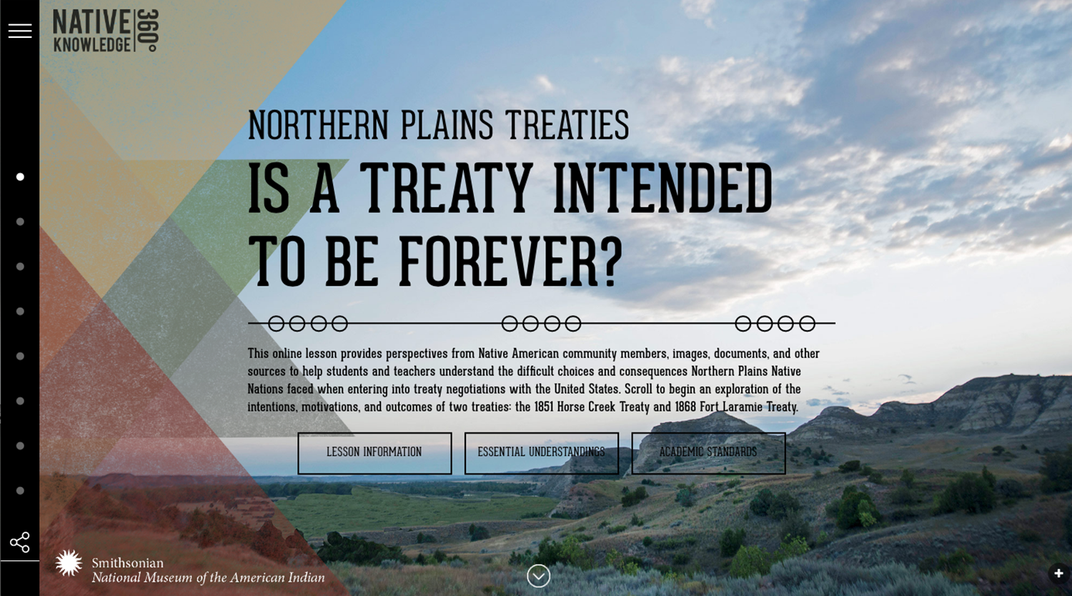NATIONAL MUSEUM OF THE AMERICAN INDIAN
Teachers, Do You Need Better Resources? You’re Not Alone: Native Knowledge 360° Is Here to Help
Teachers often struggle, through no fault of their own, to locate culturally appropriate and historically accurate teaching materials about American Indians. Many textbooks, popular media, and prepackaged curricula relegate American Indians to the distant past and fail to illustrate the dynamic and diverse cultures of Native America. The National Museum of the American Indian—through the national education initiative Native Knowledge 360°, Teacher-in-Residence (TIR) Program, and outreach to educators—wants to change all that.
/https://tf-cmsv2-smithsonianmag-media.s3.amazonaws.com/blogging/featured/NK360open.png)
Teachers often struggle, with good reason, to locate culturally appropriate and historically accurate teaching materials about American Indians. Textbooks, popular media, and prepackaged curricula typically offer minimal coverage and a single perspective on complex American Indian histories and cultures. These resources often relegate American Indians to the distant past and fail to illustrate the dynamic and diverse cultures of Native America. Likewise, when teachers lack quality sources on a topic, they are less likely to use rigorous pedagogies, such as inquiry. Through its national education initiative, Native Knowledge 360° (NK360°), the National Museum of the American Indian (NMAI) wants to change all that.
The museum's Teacher-in-Residence (TIR) Program helps teachers and teacher educators develop and refine their pedagogy and practice. Teachers in residence will join NK360° in developing materials that honor teachers’ knowledge and expertise and challenge common assumptions about Native Americans. Michelle Nelin-Maruani has said of her time as the 2016 TIR, “The summer Teacher-in-Residence position provided me with an opportunity to grow as a high school teacher and social studies consultant in a manner that I could not have thought possible. I am filled with a sense of pride in the work that is under way at NMAI.”
As educational stakeholders, we all have a responsibility to ensure that we honor the diverse histories and cultures that make up the complex fabric of the United States. This critical component of social democracy begins in the classroom. American Indians have been a part of American identity since before European arrival and the creation of American democracy. Kevin Gover (Pawnee), director of the National Museum of the American Indian, has said of the museum's new exhibition, Americans, "The images, names, and stories reveal the deep connection between Americans and American Indians, as well as how Indians have been embedded in unexpected ways in the history, pop culture, and identity of the United States.” NK360° highlights how American Indian cultures impact American identity and democracy. Created in partnership with cultural experts, educators, and historians, NK360°’s materials include narratives of the past, but also stories and voices that illustrate the rich and vibrant cultures of Native peoples and cultures today.

The museum launched NK360° and programs like the Teacher-in-Residence and the July Educator Institute in order to build a network of teachers dedicated to providing students with new and accurate perspectives. NK360° uses research-based models, such as Understanding by Design (UbD) and the Inquiry Design Model (IDM), and works with educators in the field and on staff to create materials for teachers and classrooms. To meet the needs of classroom teachers, NK360°'s inquiry-based modules align with national standards and frameworks, such as the Common Core and the C3 Framework and Inquiry Arc. Delivering content through rigorous skills-based assessment allows teachers to fuse much-needed content with the skills students need in order to succeed in college, career, and civic life.
Schools face an urgent need for culturally relevant and appropriate content and materials about American Indians. Matika Wilbur (Swinomish and Tulalip), one of NK360°’s featured agents of change, wants to create positive indigenous role models from this century. “Narrative shapes our consciousness," she says. "Our consciousness determines how we will treat each other . . . Racism is born from the narrative, which begins in early childhood development. The time for sharing, building cultural bridges, abolishing racism, and honoring the legacy that this country was built on is among us.” Matika’s words highlight the importance of institutional projects and programs like NK360°, the TIR Program, and the Educator Institute that support teachers in bridging societal divides, developing civic-minded citizens, and strengthening our democracy. Teachers and schools have the great task of developing democratic citizens of tomorrow; NK360° intends to strengthen this service and support to American democracy.
Make sure you go to NK360°’s Educator Page for upcoming materials and professional development opportunities and sign up to be on our mailing list.
MaryBeth Yerdon is an education product developer at the National Museum of the American Indian. She has taught in South Korea and in Las Vegas, Nevada, where she served as a social studies content specialist and curriculum writer. She earned a B.S. in human development from Binghamton University, an M.S. in liberal studies with a focus in human rights education from Utica College, and an M.S. in teaching and curriculum in social studies and special education from the Warner School at the University of Rochester.
